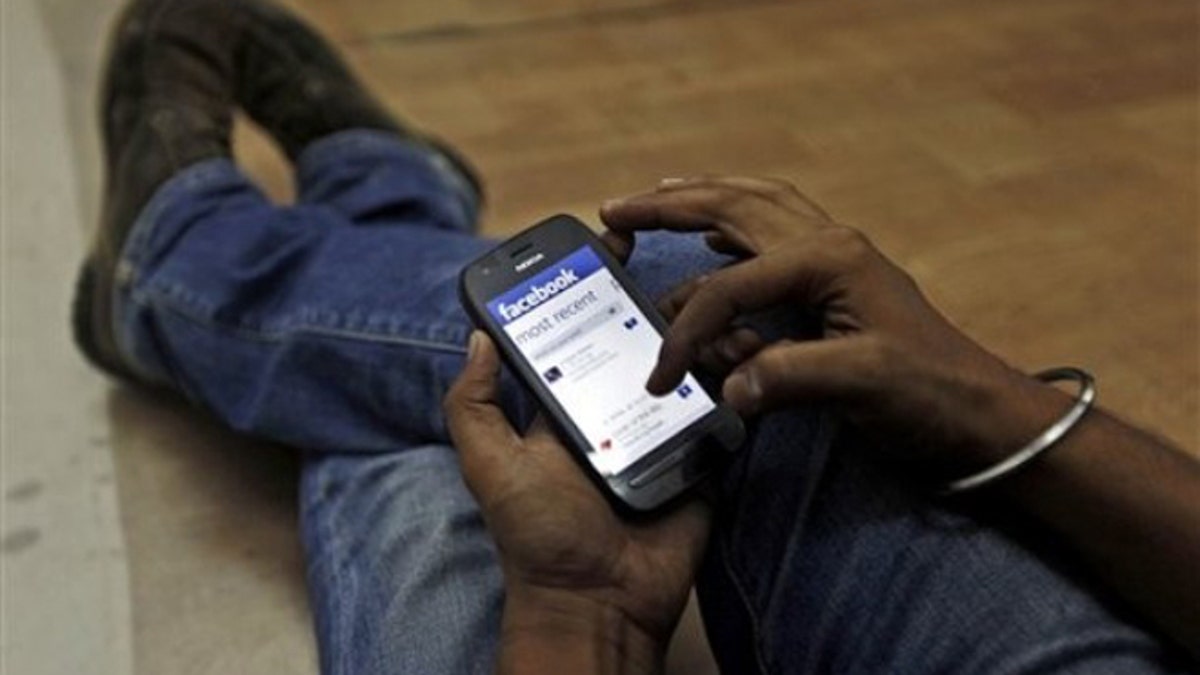
May 18, 2012: A man surfs the Facebook site on his mobile phone. (AP Photo/ Rajanish Kakade)
Going through a rough patch financially? As you cut your monthly bills to the bone, it may be tempting to decide to go without cellphone or Internet service.
But this can be one of the most risky places to cut if you are a student needing the expected tools of technology at your fingertips. It can also be a serious disadvantage if you are a job seeker. Immediate access to the Internet and telephone are important to search effectively and to be immediately available when that important job interview comes along. Additionally, it doesn't make a good impression to have no phone to list on an application or resume, or to answer your email sporadically.
For others, it can be dangerous. Without a phone or an Internet connection, seniors can become cut off from their families and health care providers.
Clearly, technology has become a basic need. That's why I'm happy to tell you that, in this difficult time when you most need it, you may qualify for a free phone and broadband service.
If you meet certain low-income requirements, you can receive a free basic cellphone with a free calling plan of 250 minutes per month. You may also be eligible to receive a $10 per month broadband Internet connection and a low-cost desktop or laptop computer for your family.
The FCC's LifeLine Assistance program was set up in the '90s to help low-income families with monthly landline bills. Over the past few years, the program has put more than 12 million wireless feature phones into the hands of low-income Americans.
The informational website FreeGovernmentCellPhones.net estimates that as many as 50 million additional households might be eligible for the program. LifeLine is funded by the small Universal Service Fee that is added to phone subscribers' monthly bills.
To get a free phone, you need to apply to one of the regional providers serving your state. The three biggest companies are Assurance Wireless, a subsidiary of Virgin Mobile/Sprint; Reachout Wireless, which is a division of Nexus communications; and Safelink Wireless, owned by Tracfone.
Unfortunately, 12 states aren't served yet. Consider buying a cheap pre-paid phone if you live in one of those. They include Colorado, Hawaii, Idaho, Minnesota, Montana, Nebraska, New Mexico, North Dakota, Oregon, South Dakota, Vermont or Wyoming.
How cheap? You can pick up some pre-paid phones for as little as $10 now, and monthly plans start at $10.
If you are in one of the 38 participating states, you'll next need to confirm that you qualify for the program. Income guidelines for free phones vary by state. If you already receive food stamps, Supplemental Security Income, home energy assistance or free school lunches, you will likely qualify for a free phone.
In addition to the feature phone and 250 minutes, eligible participants usually receive voice mail, caller ID and call waiting. You can tack on a low-cost texting plan, if needed, and it's easy to buy extra minutes when appropriate. No contracts are required.
When your financial situation improves, you just drop out of the program. If a year goes by and you still need the service, you'll re-qualify by answering a few questions.
If you qualify for the phone program, you're probably also eligible for a new program offering low-cost broadband service. To gain approval for merging with NBC Universal last year, Comcast began offering the Internet Essentials plan for low-income families.
The program is available in 40 states. Families qualify for the $10 monthly plan if they are receiving free lunches from the National School Lunch Program.
There are a couple of other conditions: You can’t have been a Comcast customer for the last 90 days, or have an outstanding bill or unreturned equipment.
Call the provider at 855-846-8376 to request an application. Under this program, qualifying families can also buy a $150 netbook computer.
The success of this program inspired the FCC to launch its Connect2Compete initiative. The agency and its nonprofit partner, Connect2Compete, are currently running a pilot program in San Diego.
As with the Comcast program, families can get fast $10 monthly Internet from Cox if they're receiving free lunches from the National School Lunch Program. They can also buy a $150 refurbished PC laptop or desktop from Redemtech.
When the program goes national this fall, most major cable companies are expected to participate. The C2C has already received $4 billion in donations from leading tech companies such as Best Buy, Intel and Microsoft.
Sesame Street, Careerbuilder, Indeed and others have climbed on board to provide educational and job content.
According to the World Economic Forum, the United States ranks 18th in the percentage of households with high-speed Internet access. About one-third of Americans still don't have a fast connection.
I'm betting that, as more low-cost technology becomes available over the next couple of years, those statistics will turn around dramatically.
Kim Komando hosts the nation's largest talk radio show about consumer electronics, computers and the Internet. Get the podcast or find the station nearest you at www.komando.com/listen. Subscribe to Kim's free e-mail newsletters at www.komando.com/newsletters. Copyright 1995-2012, WestStar TalkRadio Network. All rights reserved.
